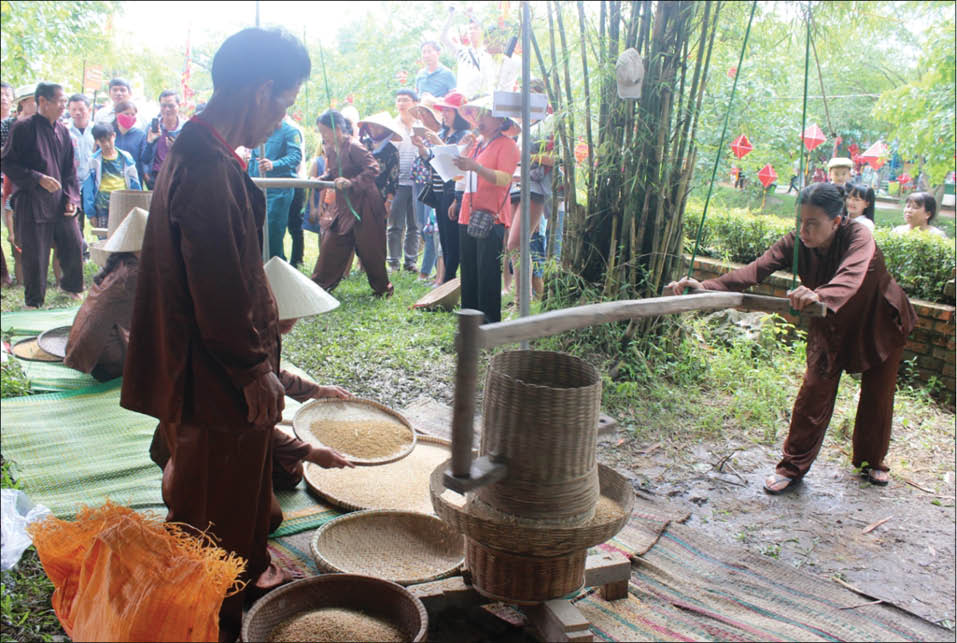
Space for ho gia gao at Village Market Festival. Photo: Thanh Doan
In those days, the Agricultural Tools Exhibition Room displayed many tools which made us feel excited and curious. The most impressive was the pestle and mortar. The sounds of the pestle hitting the mortar, together with the lyrics of the song: “Khoan ơi khoan mời bạn khoan là hò khoan ơ hớ hơ…” made our heads shake without understanding anything. The only thing we could feel was the strong and lengthened singing sounds, accompanied by the rhythm of the pestle hitting the mortar.
We grew up with the tiled-roof bridge and grandmas’ and ants’ singing. Bit by bit, I came to understand more about the farmers’ simple and modest rural life. They told us that since they were too tired with farming work, they sang to encourage one another and to forget about their exhaustion.
In the old days, couples who love each other often stood singing on the river banks, or when they were irrigating the fields with their feet, they took the chance to flirt each other through songs. Farmers love ho gia gao because the lyrics come from folk poems and anecdotes. It is performed in a simple but lively manner and becomes very exciting and alluring when it reaches the climax. Audience are often farmers and villagers, gathering by the river or in the shade of bamboos in the village.
Ho gia gao is a type of folk song, very popular in many areas in the Central, especially in Hue. As we know, ho gia gao shows are very well organized. Each consists of 4 singers, forming 2 couples of one male and one female each. One couple sing love songs, the other, mocking songs.
However, ho gia gao singers at Thanh Toan Tiled-roof Bridge are mainly old women at the age of around 80. They sing individually, or probably play both the male and female roles at the same time. Lyrics are mainly about the farming life or the relics in the area. The first song that I heard by the gentle river of Nhu Y began like this: “… Ờ hớ hơ. Hỡi em ơi, quê hương anh là Thủy Thanh, cầu ngói, chơ Huế kinh thành lặng lẽ. Thắng cảnh Hương ơ với dòng Hương. Ờ hớ hơ…” (Darling, Thuy Thanh is my native village with the tiled-roof bridge, the quiet Imperial City of Hue. There is the river of Perfume...)
Their performance of ho gia gao often takes place in the quiet rural setting. The singing thus sounds slow, echoing over the fields and the rivers. Despite their old age, they know how to take care of their voice and their health, so that they can sing long sentences clearly. It is grandmas in ao ba (a type of garment) and with hair buns, together with ho gia gao that make the rural area lively.
Grandmas not only sing ho gia gao, but recite poetry, sing lullabies, sing songs while irrigating the fields with their feet, which fills the village with poetry and happy and exciting songs, attracting innumerable visitors. Villagers living far away from home, especially those who live abroad, love listening to their songs to recall their peaceful memories of their old days.
Today, farming work as well as many other handicrafts have been mechanized. Some old objects have disappeared from our modern life. Activities connected with farming are thus gradually fading away. Many young people today are no longer interested in old songs, but international music and new music instead.
In order for their children and grandchildren not to forget the lyrics of ho gia gao, they have carefully recorded them in their notebooks. They always want the next generation to protect and develop these modest folk melodies.
It would be insufficient if one visits Thanh Toan Tiled-Roof Bridge but misses the chance to listen to ho gia gao by Nhu Y River. It would not sound monotonous as one often thinks, but on the contrary, very deep and sentimental. One should listen to ho gia gao to get more knowledge about our ancestry’s wet rice agriculture as well as life of farmers.
By LAM TRUC
